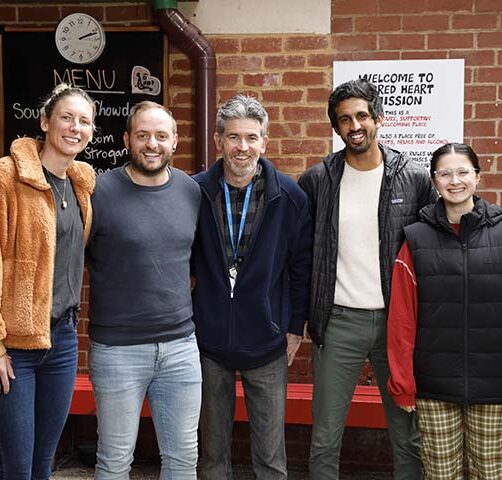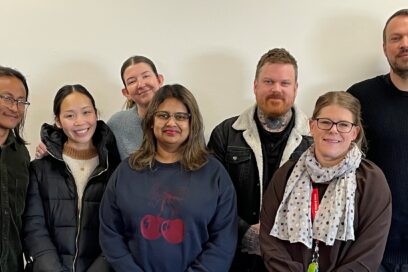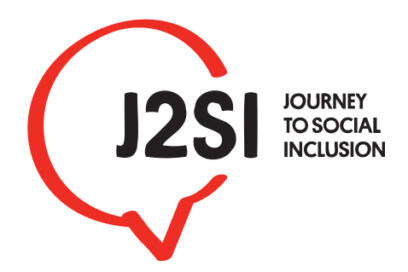The Journey to Social Inclusion Program (J2SI) takes a relationship-based approach, provides long-term support, and works from the premise that if people can sustain their housing, this provides a solid foundation to improving other areas in people’s lives.
Contact us
J2SI program
What makes the J2SI program unique
J2SI is a housing first approach coupled with three years of intensive support that wraps services around each person we work with. With a strengths-based lens, J2SI places people’s needs at the centre of service delivery. It works to end homelessness, rather than simply manage it.
There are five elements of the service model:
- Assertive case management and service coordination
- Housing access and sustaining tenancies
- Trauma-informed practice
- Building skills for inclusion
- Fostering independence
Intensive support and case management is provided to improve all areas of people’s lives. This includes supports to:
- get and stay in housing
- improve mental health and wellbeing
- resolve drug and alcohol issues
- build skills
- increase connection with the community
- contribute to society through economic and social inclusion activity.
This means in addition to exiting homelessness, people are supported to improve their health and well-being, and to build the skills, independence and social connections required to experience and maintain a better quality of life.
J2SI is able to provide clients with support to achieve these goals because of the three years of intensives support – as long as any other program in Australia.
Since its launch in 2009, J2SI has proven to create both social and economic benefits to participants, government and the community.
Scaling J2SI Across Victoria
Sacred Heart Mission, The Salvation Army, Uniting Vic/Tas and VincentCare Victoria are delivering J2SI in Melbourne and regional Victoria from 2024 to 2029 with funding from the Victorian Government’s Early Intervention Investment Fund. Working with Homes Victoria, we will support hundreds of Victorians experiencing chronic homelessness.
Continuous Improvement through the Phases of J2SI

J2SI across Australia
Our vision is to have the J2SI program delivered by partner service providers, under license, across Australia.
To support fellow homelessness agencies to replicate J2SI with other State and Territory Governments we established the J2SI Evaluation and Learning Centre (J2SI ELC) to provide homelessness services organisations access to tools, training and consultancy to obtain funding for and to deliver a J2SI program in their region.
Detailed information about J2SI ELC for homelessness agencies and governments is available here:
Why the need for J2SI?
Long-term homelessness is a significant indicator that the service system is failing people who have complex needs. Of the 116,000 Australians who are experiencing homelessness, an estimated 25,000 are trapped in the cycles of long-term homelessness.
The traditional service system is crisis orientated. It fails to address the compounding issues that result in long-term homelessness: shortage of affordable housing, ongoing unemployment, mental health issues, substance abuse, failed transitions from state care or prison, relationship breakdowns and family violence.
There is also a strong connection between trauma and long-term homelessness. Many people who are experiencing long-term homelessness report high levels of abuse and other traumatic experiences, often in childhood.
The current system is ill-equipped to manage the level and intensity of support required to help people exit long-term homelessness.
For each Australian who is experiencing long-term homeless, it costs the community between $900,000 and $5.5 million.*
*‘Lifecourse Institutional Costs of Homelessness for Vulnerable Groups’, School of Social Science, University of New South Wales
Criteria for participating in J2SI
Individuals who are interested to join the J2SI program need to meet all of the following criteria:
- They have been sleeping rough for a while (i.e. over a year steadily).
- They have experienced homelessness at least once a year over the past three years.
- They are currently accommodated at a crisis accommodation service or have been using Open Access services regularly for three months or more.
- They are between 25 and 65 years of age.
- They give consent to participate in the service.
How to be referred to J2SI?
If individuals meet the eligibility criteria they can speak to a Key Referral Worker for further information about J2SI:
- Flagstaff and Open Door Accommodation Services, Salvation Army
- Ozanam House and Community Centre, Vincentcare
- Southbank Crisis Accommodation, Launch Housing
- Sacred Heart Central, Sacred Heart Mission
- Women’s House, Sacred Heart Mission
- Homefront Crisis Accommodation, Sacred Heart Mission
Resource centre
Download our selection of research findings for detailed information about J2SI and its outcomes:
J2SI Pilot
J2SI Phase Two
Don’t miss a beat
Learn more about homelessness and how we can solve it together in our newsletter, Heartbeat





